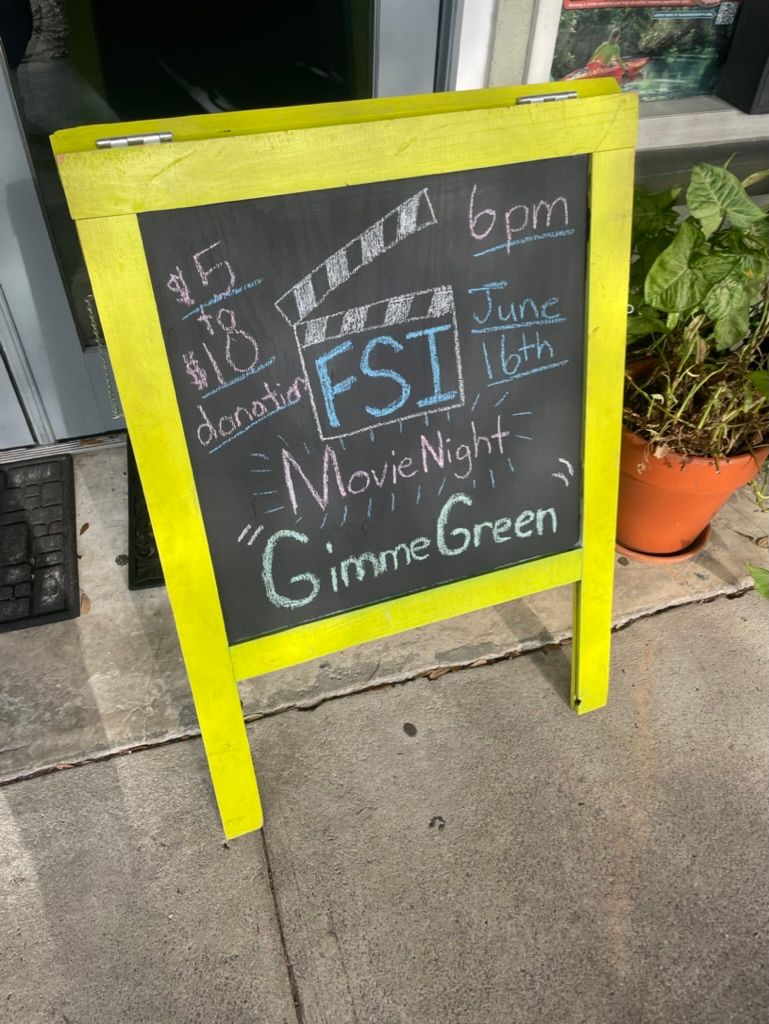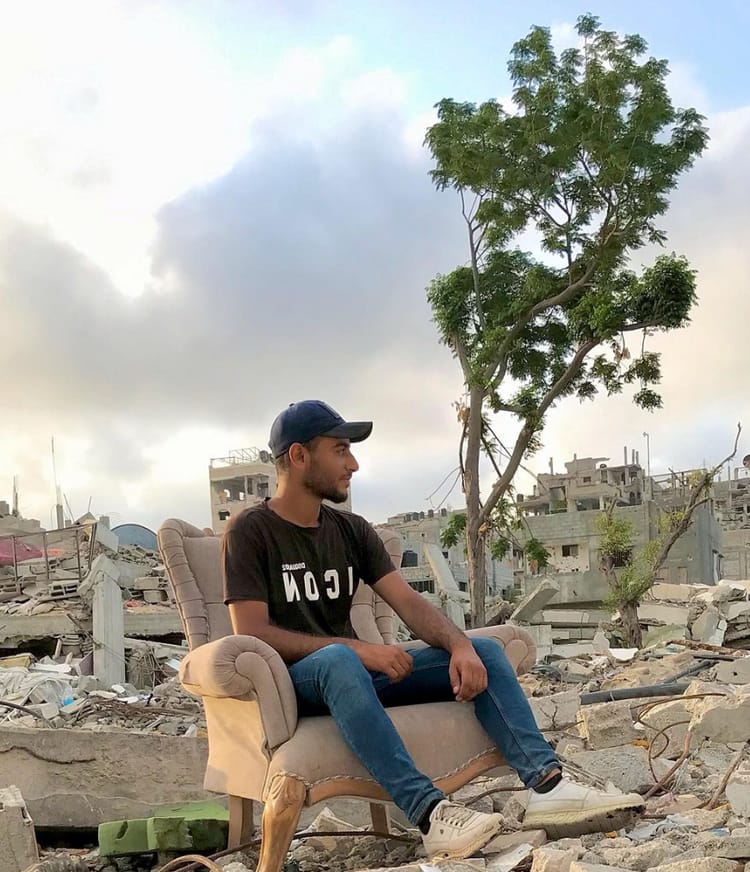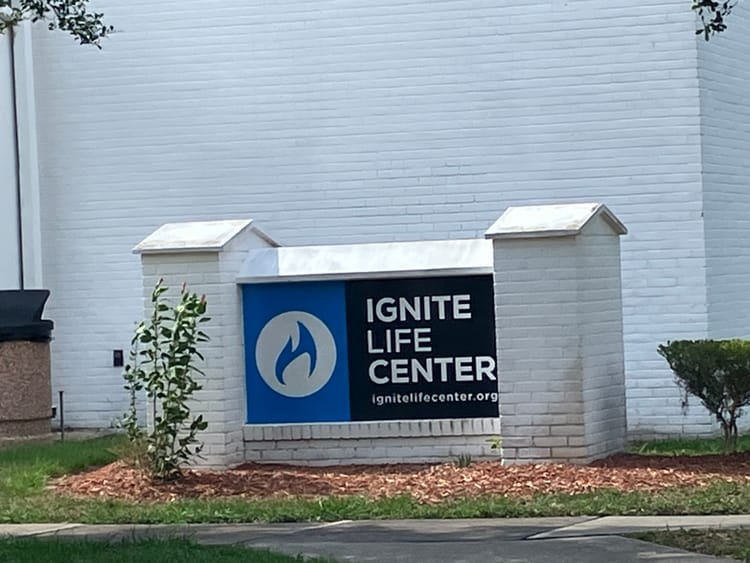Florida Springs Institute Holds Free Screening of Gimme Green: An Interview With the Producer

On Friday, June 16th, Florida Springs Institute held a free screening of the short film Gimme Green by Eric Flagg and Issac Brown with Jellyfish Smack Productions. The film was released in 2007 and details the world of the lawn industry that exists under our noses in suburban America. I got the chance to interview Flagg after the screening on why he made the film and how it holds up 15 years later, as well as his overall goals in film production.
Q: What made you decide to make Gimme Green?
A: So in the program that I studied, the Documentary Institute at the UF School of Journalism, it's not there anymore, unfortunately. We had a pair-up with a thesis partner and Isaac Brown and I knew we wanted to do an environmental story. Our professors gave us a list of topics to never make a documentary film on if you wanted to be commercially successful. It was Vietnam, homelessness, AIDS, and the environment. We asked, why is that the case for environmental films? It was because it leaves people feeling hopeless like there was nothing they could do. So we said, all right. Let's think of a way to do an environmental film that everybody can relate to. Give them something they can do. We also decided we want humor to be a factor. We feel like you can really disarm people, and get them to listen if you can get them to laugh.
Through the work that I'd done with environmental consulting, I knew lawns were a big problem. I think it was both of our ideas to do lawns so we started poking around and found a wealth of visual interest.
Q: How much of Gimme Green was filmed in Gainesville?
A: We did film a lot in Gainesville. We did something we called a lawn safari. When we didn't have a big shoot planned we’d just drive around and look for interesting lawns during the day. We filmed in Florida, Georgia, North Carolina, Massachusetts, California, Arizona, New Mexico, and Washington DC. I couldn’t tell you the exact number of hours filmed in Gainesville. We had hundreds of hours of footage that were cut down to 27 minutes. The code enforcement officer was from the City of Gainesville and so was the local realtor who was the judge for the Lawn of the Month competition. We also had a couple of interviews with Gainesville residents.
Q: Do most people have any idea of the problems lawn pesticides cause?
A: I don't think so. I don't think a lot of people think about it.
Q: Do you think that if people knew the statistics, like that chemicals in lawn pesticides have been found in groundwater which becomes our drinking water, or that children in households where lawn pesticides are used are at a 6.5 times greater risk of developing leukemia, do you think they would stop using lawn pesticides with that knowledge?
A: If people are on the fence then definitely. It’s really hard to get people to take action on this. One reason is that getting rid of your lawn is an undertaking. It can cost thousands of dollars to do something else. Another problem is that if you're a homeowner and you own that landscape, you might be restricted by your homeowners' association which depending on your county or city commission could be a legally governing body and they may say you have to have it.
Watering the lawn is another issue. Someone may decide well I’m not gonna water it but if it starts to die and looks terrible the City Ordinance office may be called to come take a look at it. I think they only regulate height in Gainesville but from an aesthetic standpoint, you can get a lot of backlash from your neighbors or homeowners association.
If people are on the fence and have enough information about the issue I think yes, they could stop. A lot of organizations will tell you exactly what you need to do to get rid of your irrigated lawn. Education is the solution. There’s a great quote out there, “Everybody knows what Coca-Cola is but you don’t see them quit advertising.” It’s not good enough to just move on after one movie, you have to constantly educate.
Q: Do you think the situation has gotten better or worse since the film's release in 2007?
A: Worse, and only because of population growth. Florida nets 1,000 people a day in population growth. Even if half those people had a waterless lawn, you still get roughly 150,000 people a year moving in somewhere with some type of irrigated landscape.
That being said, there are a lot of great things that have happened. A lot of people have taken the opportunity to change this. I think there are more people than ever doing native and low-irrigation landscaping, but the population just keeps growing.
Q: Where do you think the American obsession with having a perfect lawn comes from?
A: We asked a lot of people and the answer is complicated. A number of things happened around World War 2. We perfected small motors. We had lawnmowers and small farm implements basically to manage this crop in your yard.
We also got really good at designing defoliation herbicides that we would use in the Pacific. For example, we would defoliate a small island to turn it into an airstrip so that we could bomb Japanese-held strongholds quicker and easier. Around the same time you have a massive golf turfing industry, a growing economy, and people coming back from the war.
In the movie you hear the historian Virginia Jenkins mention that most people didn't own their own homes before World War 2. When soldiers were coming back and people had more money, farmers started selling huge swathes of land to developers for signal family homes.
A number of things came together to create this multi-billion-dollar-a-year industry. Money is one of the biggest forces behind it. You'll notice around March and April, you start seeing a lot of advertisements for lawn care products on television, although I don’t have television anymore. I would assume it’s the same.
Q: Do you think the Alachua County government is doing enough to fight back against environmental issues?
A: I think that our County government has done an incredible job, but it's who we elect. The County Commission changes every few years. We've had a history of a great environmental protection department under the direction of Chris Byrd who is retired. I don't think it's the government's responsibility as an entity to protect, it's our job as citizens. We have to say, this is important to us, and we have to take action and vote to prove that. I think land trusts are a great way to do that. Alachua County Conservation Trust is an amazing non-profit that buys land for preservation. They may sell it to a park system or water management. I don’t think we should put all our eggs in the government’s basket to protect the environment, it’s about people being involved.
Q: What environmental issues should Alachua County residents be more aware of?
A: Preserving wetlands and contiguous Green Space is important for wildlife corridors to move around, but ultimately it's water. Water is the lifeblood of what makes Florida a beautiful place. It can be hard to convince new Floridians who have recently moved of the direness of the water situation. There's water everywhere, and we have plenty of water, but it's not drinking water. Confined aquifers, where our drinking water comes from, take a lot of time to recharge. Most of our waterways run out to the ocean or the gulf so that water is gone, that's not an option as a drinking water source.
Q: Has Jellyfish Smack Productions released any films recently?
A: I just did some filming on it but Issac recently directed a film called Traces. It’s about the first generation of people growing up in America whose parents survived the Holocaust. It’s a beautiful movie with a lot of animation and stories. Issac did a great job conceptualizing how it looks and sounds.
Q: What’s your main goal when it comes to film production?
A: We have a couple of goals. One is to be as observational as possible so that when you're watching, you feel like you're observing and learning, kind of in first person. The other goal is to find topics that are right under our noses. For example, the film we made after this one, Terra Blight, is about electronic waste. We looked into what happens to computers and other electronics after they’re thrown away. The answer is they mostly go into unregulated landfills in 3rd world countries, and it's shocking. Isaac and our executive producer filmed in Ghana at a huge landfill there, it's just horrible. There are children scrapping out of landfills with heavy metals and tons of lead. That's something right under your nose, you have a part in that, and there is something you can do to make it a bit better. We try to find problems that everyone plays a part in but aren’t insurmountable to tackle. We like telling smaller stories that speak to a bigger issue.
Q: What would you say is your biggest accomplishment in film production?
A: The first big accomplishment was overcoming my fear of saying I’m a filmmaker. It took me a while to stop saying I’m an environmental scientist and start saying I’m a filmmaker.
Something else I’m proud of is that we decided to stay in North Florida because we love it here, this is the place that inspired us. There’s not much of a film production industry in North Florida, so that’s something we’ve had to overcome. Myself, Issac, and his wife Ana, all teach filmmaking. It makes us better at our craft and gets us completely immersed in that world. So those are what I would say were our biggest accomplishments to begin with.
But our biggest accomplishment isn’t one event, it’s that Issac and I stuck with filmmaking, and we're still doing it. We started the program in 2004, and next year will mark 20 years we have stuck with it. That's hard to do.
Q: How do you feel like you can make a difference with documentary films?
A: Being able to take a lot of information and distill it into an entertaining story is valuable. I don't know that it changes most people's minds, but I've seen it get people really inspired. You don’t have to change everybody’s mind, you have to inspire a few people because when someone is inspired they take action. That’s the heart of what we hope happens.
If you’re interested in Flagg’s work and want to learn more about the significance of the lawn industry in American culture you can watch Gimme Green here. You can find links to other films by Jellyfish Smack Productions here.




